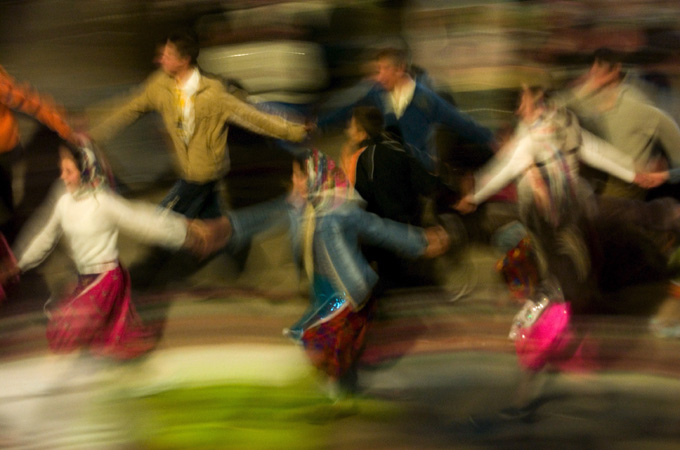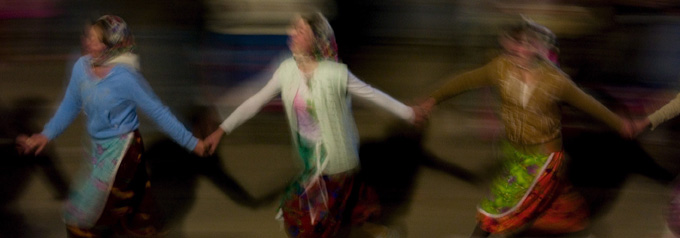Bulgaria, Turks and the politics of apology
During Bulgaria’s ‘Restoration of Names’ process, nearly one million ethnic Turks were humiliated, says author.

 |
| During the ‘Restoration of Names’ process, many ethnic Turks in Bulgaria were forced to assimilate [EPA] |
London, United Kingdom – In 1989, under the last Communist government, nearly five per cent of the population in Bulgaria left the country as a result of the forced ethnic assimilation policy for Bulgaria’s ethnic Turkish population. Soon after, Communism collapsed.
The action, cynically called “Restoration of the Names” or “Revival Process”, did not contribute to the end of Communism in Bulgaria. It was more like a sign of the agony of a rotten regime resorting to the shock of populist nationalism to defibrillate its dying heart. It took the Bulgarian parliament 22 years to adopt a declaration apologising to its own citizens for the suffering inflicted on them.
The declaration was not adopted as a result of diplomatic pressure, or in order to pave the way for a gas interconnector or trade agreement between Bulgaria and Turkey. Neither was it pushed by Bulgaria’s Turkish party nor by the European Commission – a usual spur to good deeds by new EU member states. It was a result of a painful internal process and political maturity.
But why so late? Apologies often come with great delay and are usually offered not by the people directly responsible.
Only in 1990 did East Germany apologise for its Nazi crimes. This 45-year delay is hard to understand when you realise that the country was effectively occupied by the Soviet Union – which had the largest number of victims in the WWII. In 1993, Russian President Boris Yeltsin apologised for sending 600,000 Japanese prisoners of war to Siberia after World War II.
In 1993, Pope John Paul II apologised for the Catholic Church’s role in the African slave trade. The British prime minister apologised for the slave trade only in 2007 (it was abolished in 1833) and the US Senate apologised for their history of slavery in 2009 – nearly 150 years after it was finally abolished in 1865. Apology seems never to be too late, as shown in 1992 when the Catholic Church begged pardon for putting Galileo Galilei under house arrest in 1633.
Collective amnesia
However, sometimes timely apologies can achieve near miracles. On August 29, 1993, South African President de Klerk apologised for apartheid. Two days later, Nelson Mandela apologised for the atrocities committed by the African National Congress against suspected enemies. These two apologies probably saved the country.
Likewise, the lack of appropriate apology can ruin the relationship between two countries: such as the case with Turkey and Israel at the moment. Following the raid on a Turkish boat, attempting to break the Gaza blockade in which nine Turkish citizens were killed, Israel said that it was “willing to consider an apology over problems that arose during the operation on the Marmara, if there were any”. That was not enough for Turkey, and it expelled the Israeli ambassador from Ankara.
After 1989, Bulgaria sunk into a collective amnesia about the “Restoration of the Names”. A few books and documentaries appeared, but were usually met with mumbled accusations that “now is not the time for this” and “why do we have to ignite healed ethnic tensions?”
The Socialists, who inherited the Communist party, as well as the confusion over its guilt, did not take up the initiative. The anti-communist spectrum, which started ageing and fading soon after its conception, got into a tactical war with the Turkish party and also did not push hard enough.
 |
| During the ‘Restoration of Names’ process, nearly one miillion Muslims were humiliated, 350,000 people left the country and names were even removed from gravestones [EPA] |
In 1998, when the incumbent Bulgarian president, Petar Stoyanov, did apologise to Turkish President Suleyman Demirel for the Bulgarian atrocities, it was an enlightened personal act rather than an expression of collectively recognised responsibility. Political parties were also cautious not to alienate voters with nationalist sentiments. Bulgaria entered into “we don’t talk about this in the family” mood.
In that sense, the apology was surprising. The Balkans is not a particularly apologetic place. Apology equals weakness. If somebody ever discovers “a Balkan gene”, it would be the gene for blame. The second Balkan gene would be that of denial. Maybe this unapologetic nature of the Balkans stays in the centre of countless Balkan conflicts, mistreatment and atrocities.
When you read textbooks lovingly written by Balkan historians you will see that most of them are based on the premise that throughout history “everybody was against us”. The Balkan self-victimisation obsession and the view that “all neighbours are bloodthirsty enemies” is deeply embedded in the public discourse.
A deadly cocktail
Often, it is virtually impossible to research the past simply because the effort to understand what had happened might go against a popular poem written by a second-rate poet, but is perceived as an unquestionable source of a sacred truth. The popular perception of the Ottoman Empire is that it was five centuries of darkness, coloured only by the rivers of blood of brave men and women who chose death over forceful Islamisation.
After WWII, the militantly secular Communists preserved this line, mainly because Turkey was, by then, a member of that other bloodthirsty empire – NATO. The term for the Ottoman period was shifting all the time. Depending on the state of the relationship between Turkey and Bulgaria (which closely followed the level of Soviet obsession with NATO), the term used varied from “Turkish Slavery” to “Osman Slavery” to “Ottoman Rule”.
The Bulgarian independence (of sorts) from the Ottoman Empire, which came as a by-product of the 1878 Russian-Turkish war, was compared with the Bulgarian occupation by the Soviet Union (which in turn was a by-product of the second World War). The two events produced the daft phrase “Uncle Vanya – our double liberator”. Translated, that would mean something like “The Russians, who are brothers Slavs, have liberated us from Muslim Turkey and then from Fascist Germany”.
|
“Bulgaria’s unexpected apology … sets an unusual precedent for relations in the region.” |
Unfortunately, they didn’t manage to liberate the whole of Europe, or even the whole of Germany. In that way, the Fascists, Turks, Washington, Ottomans, London, Muslims and Catholics were mixed into a deadly cocktail of past and present. Our land was regularly purified by the elements of this propaganda mix.
That was the background on which the twisted mind of the Communist government devised the Orwellian theory of “the Restoration of Names”. The changing of names was a collective favour by the state which gave back Bulgarian names to people whose ancestors were forcefully assimilated during centuries of cruel Turkish slavery. The “Restoration” was executed by police, uniformed and secret, party officials and the army and Bulgarian National Television (the only station). The station was showing villagers in national costumes carried away by national Bulgarian dances with which they expressed the joy of their rediscovered identity and their gratitude to the Communist Party which had facilitated the journey to their genuine roots.
Along with the celebrations, more than 350,000 people left the country.
An unexpected apology
Nearly a million Muslims were humiliated, thousands of families were terrorised – and those seen as more influential in their communities were in fact forced to leave the country. People had to abandon their homes and many were swindled out of their property in forced sales as they escaped to safety in neighbouring Turkey. Medical records were destroyed and names were even removed from gravestones.
Bulgaria’s unexpected apology is not just a necessary act to atone for a disgraceful episode in its history, but also sets an unusual precedent for relations in the region. If all Balkan countries decide to apologise for all the atrocities they have committed to their citizens and against each other, they will have to spend a year doing so.
But the ability to recognise not just mistakes, but also sins, and to be able to assume collective responsibility on behalf of others is not only a political and diplomatic gesture, but also an act of purification which opens the door for the establishment of trust. It liberates people who would otherwise stay stuck in the past, handcuffed by prejudices and vulnerable to atavistic political campaigning. An apology opens a way forward and an opportunity for politicians to offer policies rather than protection to their supporters.
Beyond Bulgaria it suggests something more. Apology should be recognised as a key instrument for building a safe and prosperous future – especially in the Balkans and the Middle East. In cases such as Armenia and Turkey, Palestine and Israel, Kosovo and Serbia the past might be extremely complex. The politics of apology, however, may be more powerful than the politics of retribution.
Julian Popov is a journalist, consultant, director of the UK charity organisation Friends of Bulgaria, and chairman of the Board of Directors at the Bulgarian School of Politics.
Follow him on Twitter: @julianpopov
The views expressed in this article are the author’s own and do not necessarily represent Al Jazeera’s editorial policy.
